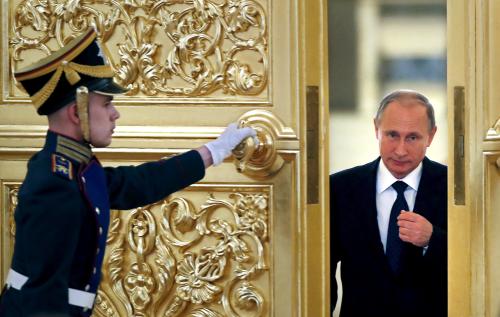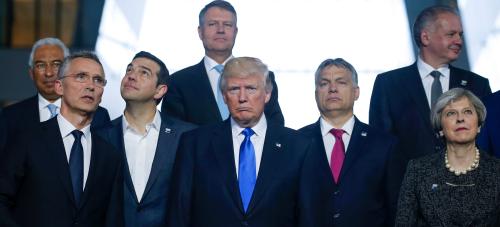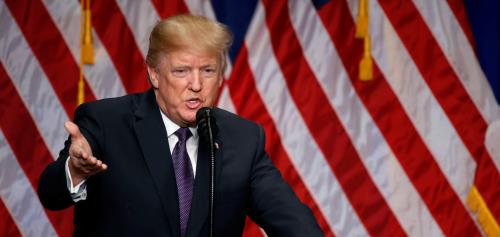At the Munich Security Conference, few seemed to care about the numerous security flash points around the world. There was no overarching threat or narrative that captivated participants, no sense of urgency, and no feeling that we were truly on the brink, writes Thomas Wright. This piece originally appeared in The Atlantic.
On the last day of the Munich Security Conference, Republican Senator James Risch of Idaho was in a bit of a bind. He needed to leave the Bayerischer Hof Hotel by 9:30 a.m. to catch a flight, but also wanted to appear on a 9 a.m. panel of U.S. senators and members of congress to discuss U.S. foreign policy. While it may have made sense for Senator Risch to cede the spot to someone else, he had something he wanted to say—a “pretty dire” message for the participants on the “really dangerous situation” in Korea.
President Donald Trump, Risch said, was determined to prevent Kim Jong Un, the leader of North Korea, from developing the ability to hit American cities with nuclear weapons. And no one should doubt the president’s commitment to this goal, he said. Risch was keen to clear up a common misconception: Trump was not, in fact, considering a so-called bloody nose strike whereby the United States would use force to send a message of resolve to Pyongyang:
There is no “bloody nose” policy. Senator [Jeanne] Shaheen and I drilled down with the administration on that and nobody knows where that came from. It appeared in the national media, [and] the administration says they’ve never used the term. … There is no such thing. And if you think about it, it absolutely makes sense.
If this thing starts, it’s going to [probably be] one of the worst, catastrophic events in the history of our civilization, but it is going to be very, very brief. The end of it is [will] see mass casualties, the likes of which the planet has never seen—it will be of biblical proportions. … This president has at his fingertips the ability to dispense what he has said he is going to dispense, if the North Korean regime, if Kim Jong Un, continues down the path that he is [on] … the president can do this quickly and, as I said, it is at his fingertips.
While it’s unclear exactly what Risch was suggesting (you can watch the video of the exchange here to draw your own conclusions), the implication of his message was startling: The president of the United States is willing to launch a major war in the near future if North Korea does not back down.
With his point made, Risch got up and left for the airport, by my watch at 9:17 a.m., without taking questions. It was an extraordinary intervention. Risch is next in line to chair the Senate Foreign Relations Committee if Bob Corker makes good on his promise to retire and Republicans retain control of the Senate. His words on these matters are of great significance.
Yet after Risch departed, the panel went on as normal. No one said much about North Korea except to reiterate that there is no bloody-nose strategy. Other preventive-strike options, which do appear to be under serious consideration, were not discussed. Indeed the prospect of the use of force against North Korea hardly came up earlier in the conference. If northeast Asia is on the brink of war, future historians will remark on how remote it seemed during that snowy weekend in Munich back in February of 2018.
The Risch intervention summed up the paradox at the heart of this year’s Munich Security Conference, whose official theme was “To the Brink—and Back?” There was no overarching threat or narrative that captivated participants. There was no sense of urgency. No feeling that we were truly on the brink. But, if you looked, red lights were flashing everywhere.
The Middle East appears on the verge of a new conflict involving Israel, Iran, and its proxy forces in Syria and Lebanon. Benjamin Netanyahu, the prime minister of Israel, provided the conference with its “Munich moment” as he held up a piece of an Iranian drone and asked Javad Zarif, Iran’s foreign minister, if he recognized it. He went on to say that if Iran continues trying to establish a presence in Syria, Israel will go to war to prevent it. Zarif dismissed Netanyahu’s accusations as a “cartoonish circus” but convinced no one with his argument that Iran was not trying to dominate the Middle East.
The Israel-Iran clash in Syria is just one of several flash points in the region. Others include the possible collapse of the Iran nuclear deal in May if President Trump refuses to re-certify it, tensions between Turkey and the United States, and clashes between Russian and American forces also in Syria.
Meanwhile, European and American officials did little to dispel the notion that the West is in disarray. The foreign and defense ministers of Germany left the impression that they are not ready to take on a larger role in European security. The Polish and Austrian prime ministers made controversial remarks around the Holocaust and “Judeo-Christian values” respectively, highlighting the risk of a drift to the right in Europe. Theresa May, the prime minister of Britain, made a constructive speech about preserving security cooperation with the rest of the European Union, one that underscored how the best-case scenario for Brexit is maintaining the status quo. Only France’s delegation—led by Prime Minister Édouard Philippe and Defense Minister Florence Parly—truly impressed.
And doubts about who truly speaks for the Trump administration continued to swirl. H.R. McMaster, his national security adviser, called the evidence of Russian interference in the 2016 U.S. election incontrovertible. He even seemed to treat Robert Mueller’s indictment of 13 Russians as part of America’s response. McMaster also feistily responded to a question on U.S. cyber policy from a Russian politician: “I’m surprised there are any Russian cyber experts available, based on how active most of them have been in undermining our democracies in the West.” But any hope that McMaster was speaking for his boss was soon dashed. In a tweet, Trump criticized him for not saying the interference had no impact on the election—a claim the former Director for National Intelligence James Clapper recently said “stretches credulity.”
There were other signs of friction within the Trump administrations. James Mattis, the secretary of defense, attended the first day of the conference but did not speak, leading to speculation that he wanted to avoid saying anything that would reveal differences with McMaster or Trump, especially on North Korea; Mattis is believed to strongly oppose a preventive strike.
Also remarkable was what the speakers failed to bring up. There was no discussion of artificial intelligence and the way it is transforming geopolitics. There was some mention of cyber attacks from Russia, but no one placed this in the context of a broader competition between democratic and authoritarian powers. The challenge that China poses to Europe and the United States was particularly conspicuous by its absence.
Wolfgang Ischinger, the chairman of the conference, made several impressive attempts to encourage senior officials to consider how to preserve the liberal international order—to find a way back from the brink— but his message went unheeded. So did Senator John McCain’s. McCain led the U.S. delegation to Munich for many years, but was too ill to travel this time. He sent a written message to participants. It read, in part: “I am counting on all of you, my friends, to honor the precious, beautiful things that are still entrusted to our care. I am counting on you to be brave. I am counting on you to be useful. I am counting on you to keep the faith, and never give up.”
But it was not a year for bravery, usefulness, or faith. It was a year for false bravado, contradiction, and selfishness. The question we are left with is this: We know things are bad in our world today, but will they break? Judging from the proceedings in Munich, we will need to be very lucky in the year ahead for the answer to be no.
The Brookings Institution is committed to quality, independence, and impact.
We are supported by a diverse array of funders. In line with our values and policies, each Brookings publication represents the sole views of its author(s).








Commentary
Op-edA weekend for ignoring signs of doom
February 20, 2018